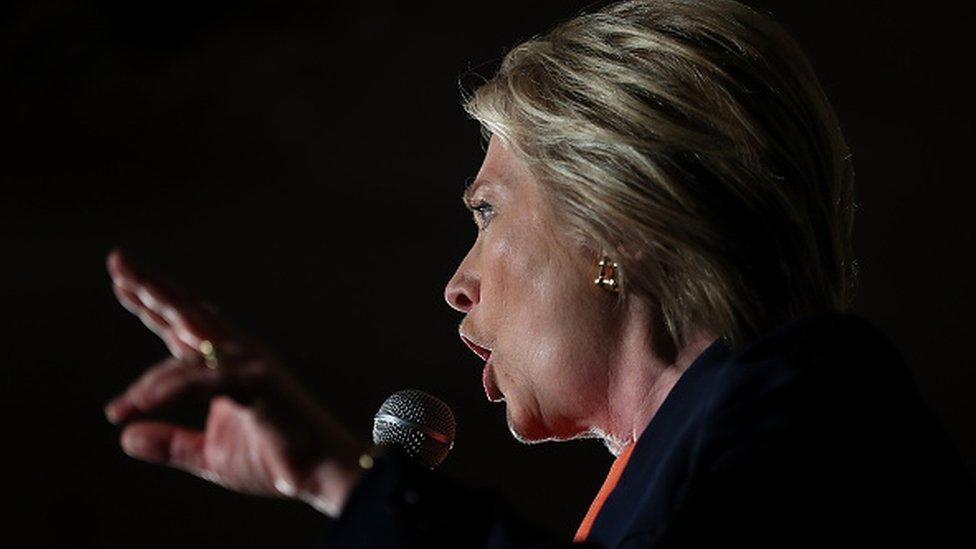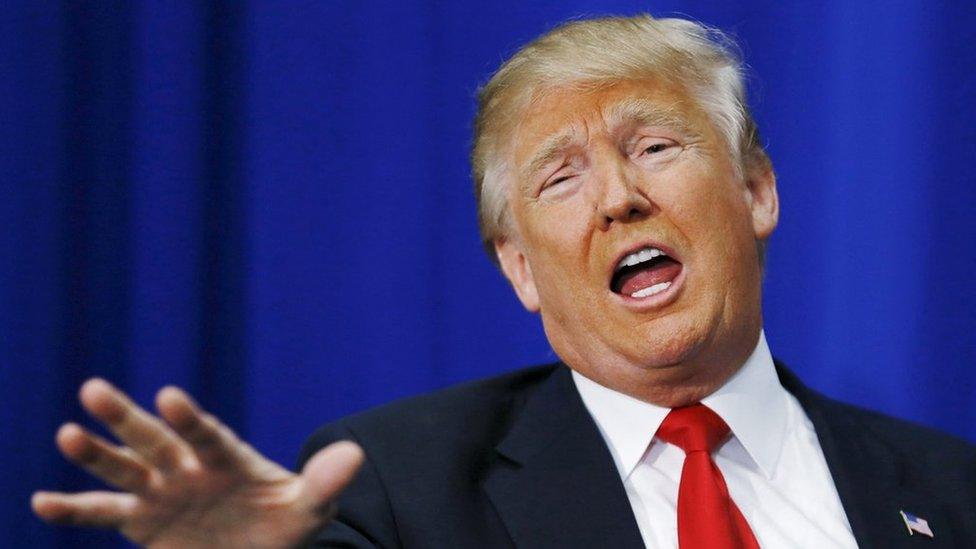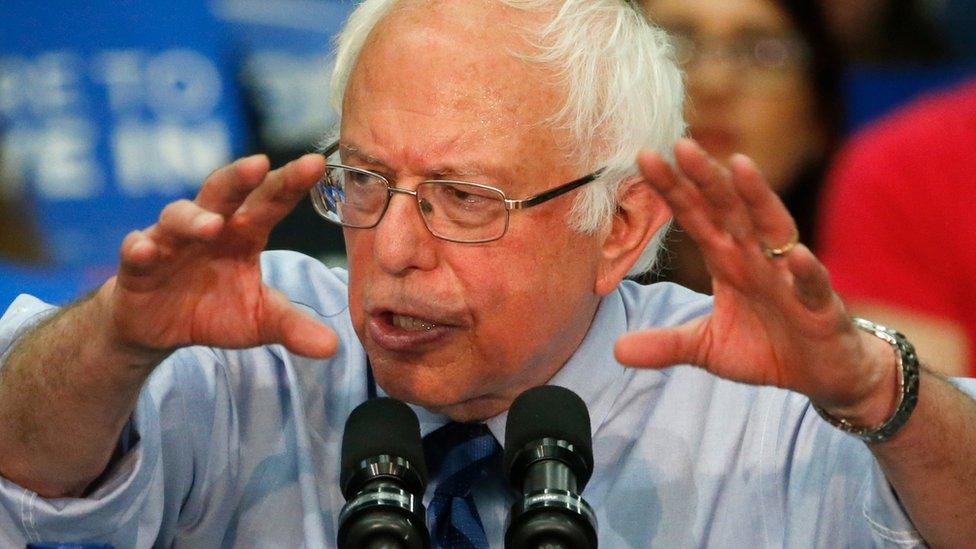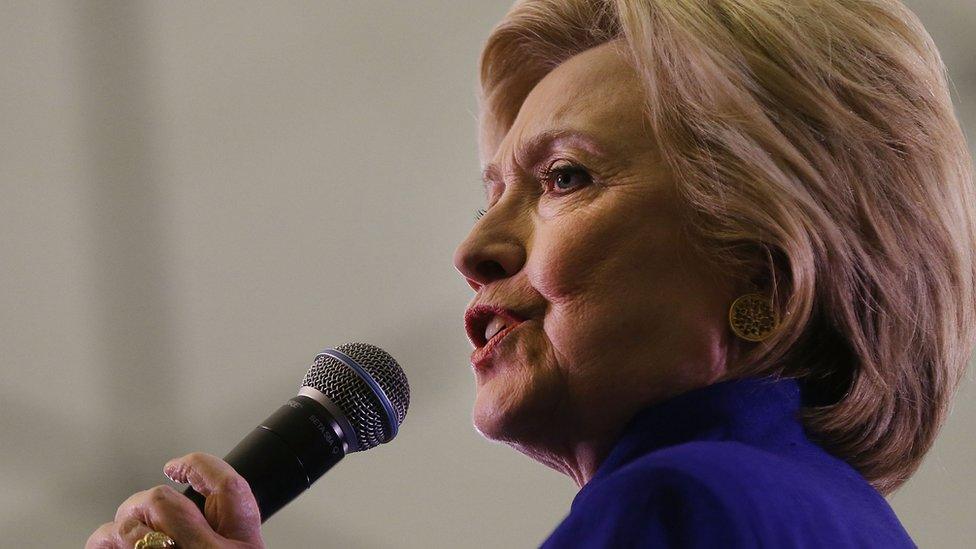US election 2016: Can Clinton win over Republican moderates?
- Published

Some may have expected Democratic front-runner Hillary Clinton to swing further left to woo supporters of her Democratic rival Bernie Sanders ahead of the California primary on Tuesday.
Instead she came out swinging against Donald Trump in a scathing speech that made clear she's looking to appeal to a broad centre in the general election.
Billed as a national security speech, her address lacked any new proposals. Instead it was a forceful, often mocking, rebuke of the presumptive Republican nominee, as she framed her pitch in patriotic terms that could also resonate with Republicans.
Mrs. Clinton presented herself as the real defender of American values and a commander-in-chief with a steady hand who believed in America as an exceptional country.
Mr Trump on the other hand, "believes America is weak. An embarrassment. He called our military a disaster. He said we are, and I quote, a third-world country," said Mrs Clinton, speaking in San Diego, a city with 95,000 military personnel.
Mrs Clinton was introduced by the spouse of an active duty naval officer and spoke with 20 US flags prominently displayed behind her.
Hillary Clinton: "Donald Trump's ideas aren't just different, they are dangerously incoherent"
Although still fighting a primary, Mrs. Clinton is clearly making a play for independent and Republican voters who are concerned about Mr Trump's erratic foreign policy pronouncements but also his statements on women, Mexican immigrants and Muslims. On Thursday, the head of Hispanic media relations for the Republican National Committee, Ruth Guerra, resigned.
Mrs Clinton has always had the potential to appeal to moderate Republicans turned off by their party's stance on social issues such as gay marriage, abortion and even guns, but who feel she is tough enough on foreign policy.
In late April, during her speech after her victory in the Pennsylvania primary, external, Mrs Clinton appealed to "thoughtful" Republicans, independents and Democrats to stand together against divisive candidates on the Republican side.
Although House speaker Paul Ryan finally endorsed Donald Trump, external on Thursday after weeks of hesitation, prominent Republicans are not rushing actively to back the presumptive Republican nominee just yet. At least nine Republican governors, and a number of senators, are steering clear from their party convention in July.
There has also been a trickle of lifelong, prominent Republicans who openly say they will vote for a Democrat for the first time in their life in November.
Mrs Clinton's message on American global leadership may not resonate widely with the GOP (Grand Old Party; Republican) base which is turning more isolationist - but it is finding an audience with many moderates and foreign policy thinkers.

Donald Trump has caused divisions in the Republican party
On Twitter, the hashtag #RepublicansforHillary was trending for a day this week, after an interview on US cable TV with a former Reagan administration official, Doug Elmets, who said that "four years of Hillary Clinton is better than one day with Donald Trump as president".
Widely quoted in the US media as well was retired army colonel Peter Mansoor, a former aide to General David Petraeus during the Iraq war.
Mr Mansoor said he would be voting for Mrs Clinton not because he had converted to being a Democrat, but because Mr Trump was dangerous.
Elections are not won on Twitter and a handful of Republicans won't tip the balance in November, but the chatter on social media is bringing out voices from the Republican party silent during the raucous days of the Republican primaries and raising questions about a ripple effect.
Mr Trump has been criticised by leading names such as former secretary of defence Robert Gates, external, former CIA director Michael Hayden, external, former Bush administration spokesperson Tony Fratto, historian Max Boot and commentator David Frum, a former speechwriter for George W Bush.
Clinton campaign aides were not willing to discuss their strategy to appeal to moderate Republicans, especially while the Democratic primary is still under way. But they acknowledged there were Republicans, particularly those concerned with foreign policy issues, who could support her.
Vin Weber, a Republican strategist and former congressman who supported Jeb Bush in the primaries, said Mrs Clinton should enlist Republican advisors.
"If she were campaigning like her husband, she would move to the centre, and try to get votes that are not locked up by the Republican Party," said Mr Weber, who said he was still doing some hard thinking about how to vote in November.
Democratic pollster Stanley Greenberg says a recent poll shows moderate Republicans represent a "stunning 31% of the GOP base", what he describes the alienated third of the party, external.
"They are disproportionately college graduates in a white, working-class party, and they are socially liberal."
On marriage equality, climate change or abortion rights, those GOP moderates are more in sync with the Democratic party. The poll, conducted in February when all the Republican candidates were still in the race, showed that 10% of Republican moderates would vote for Clinton.
Kori Schake, a fellow at the conservative Hoover Institution, said that Clinton's challenge would be to convince anti-Trump Republicans they actually need to vote for her - not simply refrain from voting for Mr Trump.
"Republican refuseniks are not enough to make a difference," she said.

Many of Bernie Sanders' supporters feel alienated by Mrs Clinton
Ms Schake said presenting Mr Trump as dangerous was an effective strategy, but it was also key for Mrs Clinton to frame her pitch in economic terms.
She had to press home the damage she believed a Trump presidency would cause to the economy - but to do so would require moving decisively to the right of Mr Sanders, and risk alienating many in her own party.
"I've just come back from Cuba, and I've seen what a Sanders economy looks like," said Ms Schake.
Mrs Clinton will seek to unify the Democratic party ahead of the convention, She will not undo the positions she has taken during the drawn-out primaries to appeal to the Democratic base.
But to win those moderates Republicans, she will now need to present herself not just as the candidate of her party's middle but of America's centre.
- Published3 June 2016
